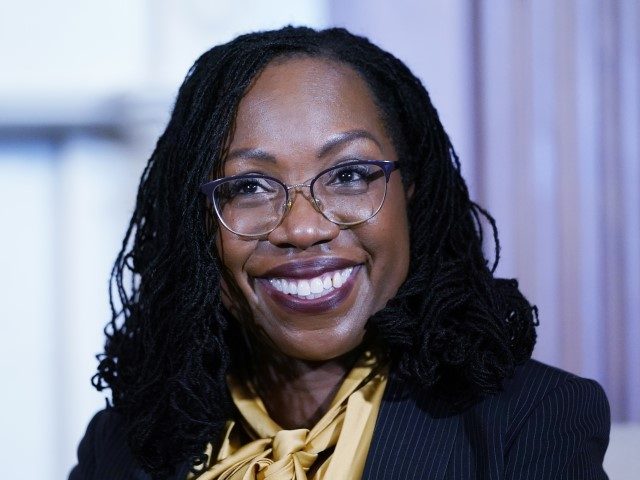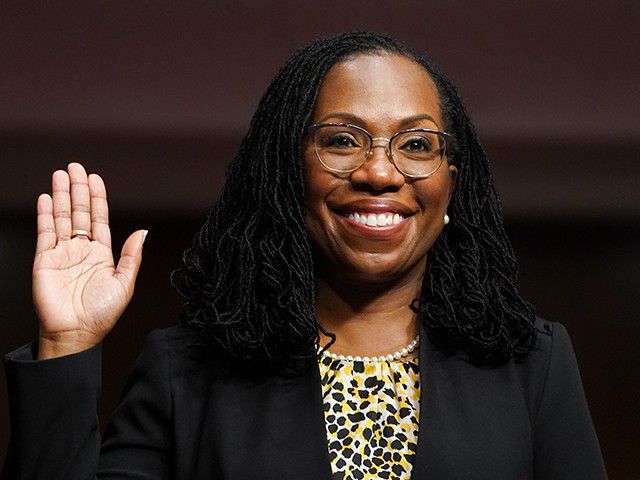Dixon-Hamilton: Biden Erroneously Claims His SCOTUS Nominee Is ‘Top Legal Mind’

President Joe Biden erroneously claimed his U.S. Supreme Court nominee, Ketanji Brown Jackson, is “one of our nation’s top legal minds,” even though no legal scholars consider her as such.
“I did that four days ago, when I nominated Circuit Court of Appeals Judge Ketanji Brown Jackson, one of our nation’s top legal minds, who will continue Justice Breyer’s legacy of excellence,” Biden said during his State of the Union address on Tuesday.
“A former top litigator in private practice. A former federal public defender. And from a family of public school educators and police officers. A consensus builder,” he added.
However, the only reference to Jackson as a “consensus builder” comes from Biden himself. Additionally, no one in the legal community has considered Jackson a “top legal mind.” For example, Jackson was considered to be at the bottom of the pack of the roughly ten district judges former President Barack Obama appointed to the D.C. federal district bench.
The progressive organization Demand Justice even left Jackson’s name off its lengthy list of “diverse, progressive” Supreme Court candidates released in 2019.
In fact, Jackson is notorious for her high record of opinions reversed by the D.C. Circuit Court of Appeals. “She’s someone who has a record of being regularly overturned by the D.C. Circuit, including the most liberal judges in that circuit,” said Carrie Severino, president of the Judicial Crisis Network. An Ethics and Public Policy Center senior fellow also called Jackson’s reversal record “striking.”
Legal scholars have also criticized Jackson for her “clunky” writing style. American lawyer Ed Whelan said Jackson’s opinions have “clunky verbiage,” “clumsy images,” and “mischosen words.”
Jackson was also criticized for using “shocking” political language when she wrote “presidents are not kings” in a 2019 opinion regarding a House Judiciary Committee subpoena request for former White House Counsel Don McGahn to testify. Ironically, that decision was reversed by the D.C. Circuit Court of Appeals.
Biden Nominee Argued Against Free Speech -- Near Abortion Clinics
 By Terence P. Jeffrey | March 2, 2022 | 4:15am EST
By Terence P. Jeffrey | March 2, 2022 | 4:15am EST
A woman walks up to you on a sidewalk in front of a department store — as you are headed into that store — and says she hopes you will not shop there because it sells products made in Communist China.
She then hands you a brochure that lists all of the products sold in the store that are produced in the People's Republic.
You may or may not agree with her request that you not patronize that store. But does she not have a right, on a public sidewalk, to say what she said and hand you that brochure (which you are also free to decline)?
Suppose your state legislature were to pass a law declaring that people who share her point of view may not approach and speak to people on public sidewalks outside stores that sell products made in China. Would that comply with the First Amendment, which denies government the power to make any law "abridging the freedom of speech"?
President Joe Biden's nominee to replace Justice Stephen Breyer on the Supreme Court argued in a federal court case that the government can in fact restrict the freedom of speech on a public sidewalk — in the vicinity of an abortion clinic.
In 2001, when Judge Ketanji Brown Jackson was a private-sector lawyer, she co-authored an amicus brief in the case of McGuire v. Reilly.
The case was then before the U.S. Court of Appeals for the 1st Circuit, which is based in Boston. Among the many "amici curiae" for whom this brief was submitted were Repro Associates, which is described in the brief as "a women's reproductive health care facility specializing in pregnancy termination," and Mass. NARAL, which is described as "a statewide organization that works to guarantee every woman the right to make personal decisions regarding the full range of reproductive choices."
The question in this case was the constitutionality of a Massachusetts law that regulated communications outside what it called "reproductive health care facilities."
"The Massachusetts Act, however, regulates conduct only within eighteen feet of a 'reproductive health care facility,'" explained the brief that Jackson co-authored.
"Within that narrow zone," said her brief, "the Act makes it unlawful to 'knowingly approach' within six feet of another person, without that person's consent, 'for the purpose of passing a leaflet or handbill to, displaying a sign to, or engaging in oral protest, education of or counseling with such other person ... "
This law, as described in the brief Jackson co-authored, did not bar everyone from approaching within six feet of another person outside "reproductive health care facilities." Nor did it apply to "all health care facilities."
People working for an abortion clinic could approach people outside the clinic.
"The Massachusetts Act applies only to 'reproductive health care facilities,' not to all health care facilities," explained the amicus brief Jackson co-authored, "and the Massachusetts Act exempts 'employees or agents of such facility acting within the scope of their employment."
The year before this Massachusetts law came up in the 1st Circuit, the Supreme Court reviewed a similar Colorado law that prohibited approaching people outside any health care facility — not just "reproductive health care facilities."
The court voted 6-3 to uphold that law.
Justice Antonin Scalia summarized the Colorado law in the dissenting opinion he wrote that was joined by Justice Clarence Thomas.
"Colorado's statute makes it a criminal act knowingly to approach within 8 feet of another person on the public way or sidewalk area within 100 feet of the entrance door of a health care facility for the purpose of passing a leaflet to, displaying a sign to, or engaging in oral protest, education, or counseling with such person," Scalia wrote in his dissent in Hill v. Colorado.
"What is before us, after all," wrote Scalia, "is a speech regulation directed against the opponents of abortion, and it therefore enjoys the benefit of the 'ad hoc nullification machine' that the Court has set in motion to push aside whatever doctrines of constitutional law stand in the way of that highly favored practice."
"Suffice it to say," Scalia concluded, "that if protecting people from unwelcome communications (the governmental interest the Court posits) is a compelling state interest, the First Amendment is a dead letter."
In the amicus brief that she co-authored, Jackson argued that it was acceptable for the Massachusetts law to target anti-abortion activists but not abortion clinic employees.
"It is hard to imagine an audience more 'presumptively unwilling' to hear protesting by anti-abortion protesters than women entering a clinic for the purpose of having an abortion," said her brief. "By contrast, however, those women can be presumed to be amenable to assistance by the clinic escorts, whose role is to help these women accomplish physical entry into the clinic facilities."
"The fact that the Massachusetts Legislature included an exception in the buffer zone statute to ensure that clinic escorts would be able to continue their integral role in physically ensuring safe access to clinics is hardly evidence of an intent to favor pro-choice speech," said her brief.
For Jackson, presuming she agreed with the amicus brief that she co-authored, it was a good and constitutional thing for someone to approach a pregnant woman outside an abortion clinic for the purpose of escorting her inside to kill her unborn child.
But it was a bad thing — that a state could prohibit by law — for someone to approach that same woman outside that same clinic to try to persuade her to save her child.
(Terence P. Jeffrey is the editor-in-chief of CNSNews.com.)
Biden has mastered the art of deflecting criticism of his corruption and incompetence by using black women as human shields. It began with Kamala Harris, who was grossly unready to serve in the White House, but whose nomination made a ticket headed by an old white hack seem transformational and whose continued presence makes it all but impossible to remove or bypass Biden from an office that he is equally unfit to occupy on ethical and moral grounds. DANIEL GREENFIELD
Biden’s Supreme Court Pick Shielded Top Clinton Aide Amid Email Scandal

President Joe Biden’s Supreme Court nominee shielded one of Hillary Clinton’s top State Department aides from scrutiny about his use of a personal email account to conduct official business.
Then-U.S. district judge Ketanji Brown Jackson in 2015 denied Gawker’s request for details about press aide Philippe Reines's stewardship of the account in the context of a Freedom of Information Act lawsuit, which sought emails Reines traded with 34 different media outlets. Jackson blocked Gawker’s request, calling it "extraordinary" and claiming there was no proof that Reines had acted in "bad faith" by using a personal email address.
Like Clinton, Reines often communicated with the press via a personal email account. That meant his communiqués were not preserved on State Department systems. When Gawker filed a FOIA request for Reines’s emails in September 2012, State Department officials were thus unable to turn up responsive records, prompting the lawsuit.
The State Department asked Reines to turn over whatever government records were in his possession around the time of the Gawker lawsuit, which he did via his lawyers in July 2015, two years after he left government service. Jackson therefore agreed to give the State Department additional time to sort through the "new" Reines records and turn them over to Gawker. Jackson supervised that process and lawyers for the parties kept her up to date on their progress via status hearings and reports.
Gawker put the screws to Reines, seeking affidavits that swore he had turned over all relevant documents and describing his methods for surrendering records to State.
"It is difficult to view the timeline of events surrounding the compilation of records responsive to Gawker’s FOIA request as anything short of a bureaucratic and managerial catastrophe," lawyers for Gawker wrote in a 2015 filing. "State has provided scant information regarding why it was not until 2015 that it finally sought to gather the records from Mr. Reines."
Jackson denied that request, calling it "extraordinary." She said that the State Department had no obligation under FOIA "to solicit or produce" documents in an ex-official’s sole possession. And there’s a crucial difference, she added, between producing requested documents—which is within the scope of FOIA—and the initial decision whether to retain said documents.
"An agency’s threshold determination regarding which records to retain in its files is entirely distinct from the agency’s subsequent search of maintained records pursuant to the FOIA—and these two duties should not be conflated," she wrote in an opinion denying Gawker’s request.
The decision was the only opinion Jackson handed down over the course of the dispute.
Jackson’s opinion parted ways with a colleague on the Washington federal trial court, U.S. District Judge Emmet Sullivan. In a separate lawsuit, Sullivan required Clinton herself and two of her top aides, Cheryl Mills and Huma Abedin, to submit affidavits along the lines Gawker sought. Gawker’s request mentioned Sullivan’s order and may have been based upon it.
Jackson said the Reines case was different because there was evidence that Clinton’s email system was designed to skirt FOIA altogether. In the Reines-Gawker fracas, she said there was a "total absence of any indicia of bad faith" on Reines’s part.
In fact, Reines explicitly wrote, "I want to avoid FOIA" on an email exchange from his personal account with John Heilemann and Mark Halperin in February 2009, around the time he joined the State Department. That indicia of bad faith was not in the record before Jackson so far as the Washington Free Beacon could tell.
Reines’s colorful if bizarre exchanges with the Free Beacon over his spat with Gawker helped cost him a job on Clinton’s 2016 presidential campaign. The clash ended when Gawker abandoned the case in 2017.



No comments:
Post a Comment